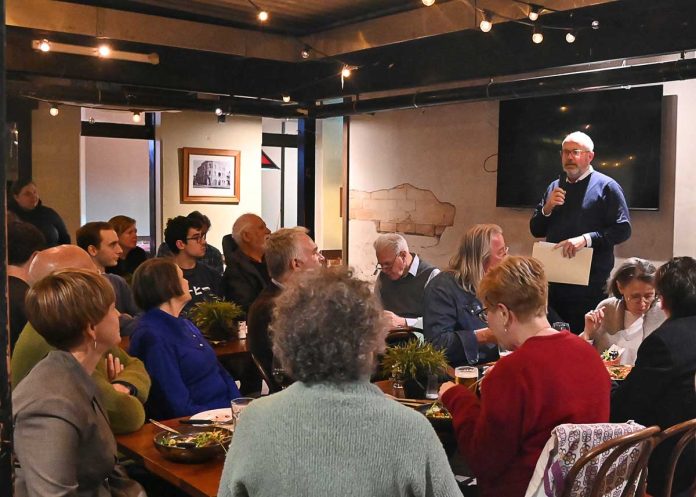The Trevor Davies Memorial Lecture is an annual event hosted by the Trevor Davies ALP Branch, and the Newtown ALP State Electorate Council. This year, it was held at the Royal Hotel on June 13. Assistant Minister Tim Ayres, a former branch member and Darlington local, was asked to deliver the address. Below are excerpts from his speech.
Trevor Davies was a fine community leader for Darlington, Chippendale, Redfern, Golden Grove and Waterloo. Trevor didn’t seek elected office outside of his beloved Labor Party, but he loved and nurtured his local community and all of the people who make it up. The South Sydney Herald was one of his many projects. I knew Trevor well, and he was always standing up for Darlington.
As we gather here in Darlington, once bustling with tanneries and breweries, the centre of Sydney’s industrial precinct, I’m reminded of the countless lives shaped by its factories, pubs and homes. This area, anchored by the presence of the railway carriage works – the largest industrial facility in the southern hemisphere – stands as a testament to the hard work that built modern Australia.
Reflecting on Darlington’s history, I recall the ordinary people doing extraordinary things, whose resilience defined these suburbs. From the struggles of the Great Strike of 1917, which galvanised workers and leaders and the urban expansion of the area, the story of Darlington is one of adaptation.
As Australia navigates the change sweeping through the world, we must acknowledge the impact of these shifts on our communities. The forced acquisitions, the disappearance of familiar pubs and homes – these losses run deep, etched into the memory of those who call Darlington home.
Australia’s changed too, and some of the things that have changed about Australia mirror some of the changes that have happened here. Looking beyond our immediate surroundings, we must confront the broader transformations shaping Australia today. The decline of our manufacturing capability, once a cornerstone of our economic identity, underscores the urgent need to reindustrialise the Australian economy.
The Future Made in Australia Act is a recognition that the world has changed. There is a new kind of competition in the world. This should not mean a pendulum swing from an open market approach to trade to a closed market protectionist approach for the Australian economy. We are a middle-sized economy on the edge of the fastest growing region of the world in human history. The idea that we would close ourselves to the opportunities and challenges of our region would serve Australia very poorly indeed. What the new landscape requires, is a new kind of industry policy. It requires the reinvigoration of our industrial base.
The Future Made in Australia agenda is the largest pro-manufacturing effort in Australia’s history. It is, in international terms, comparable with the efforts going on in economies around the world, including the United States. This bold and ambitious plan seeks not just to create jobs and foster investment but to tackle our most pressing national issues head-on. From climate action and energy security to regional resilience and global competitiveness, this agenda represents a paradigm shift in how we approach industry policy.
Central to this approach is a commitment to harnessing our industrial capabilities to confront the twin challenges of climate change and geopolitical uncertainty. These are not merely abstract concerns but tangible threats that demand practical, innovative solutions. The Albanese government recognises the imperative to build a resilient region. One that fosters peace, cooperation and sustainability – a region interconnected by shared economic goals and a commitment to environmental stewardship.
The Future Made in Australia agenda is about using all the resources we have – our vast resources of wind, solar and critical minerals – to revitalise our manufacturing sector; to become a leader in clean energy production, critical minerals processing and sustainable industry practices; and to build a future that creates opportunities not just in urban centres but in outer suburbs, regional heartlands and country towns.
_______________
If you have any questions, or would like to know more about the Trevor Davies Branch and Lecture, please email the branch’s secretary Luke at luke.hankinson72@gmail.com





